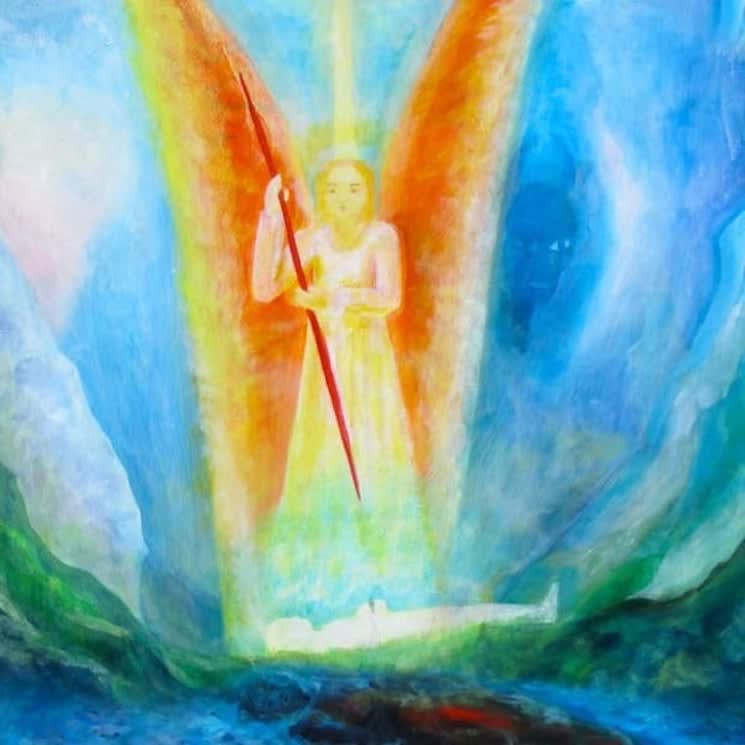Between 2008 and 2011, Salem burned bright. During these three years, the Michigan-based trio released a handful of EPs and their lone album, 2010's King Night. Their stay in the spotlight was short but sweet, eliciting strong reactions from pretty much everyone who came in contact with their music, before the group seemingly disappearing into a nihilistic haze.
Salem's legacy has lived on well past any sell-by date that was once ascribed to them. From the industrial paranoia of Kanye West's Yeezus (Jack Donoghue co-produced "Black Skinhead") to Billie Eilish's goth-pop aesthetic, Salem and the 'witch house' microgenre they helped birth have proven far more culturally resilient than anyone could have predicted.
Just as that influence appears to be cresting, Jack Donoghue and John Holland have re-emerged (Heather Marlatt was contentiously "force[d] out" of the group), bringing with them a decade-in-the-making follow-up to their debut. Fires in Heaven sounds like it could have been produced in 2011, exemplifying how far out of step with the mainstream Salem were in their heyday and how far the mainstream has shifted in their direction in the interim.
That shift is a double-edged sword; while it's easy to imagine this record being embraced by a relatively large audience in a way its predecessor was designed specifically not to, that audience's senses have also become dulled to Salem's once-frightening soundscapes. Not that Donoghue and Holland really try to outdo themselves on this front. Rather, they use their past aesthetic as a stepping stone. Fires in Heaven was mixed by Los Angeles producer Shlohmo, but production still sounds thin and tinny, retaining the homemade feel of the past. The lyricism, however, is stronger and more purposeful. In their early work, individual tracks sounded like snippets of found footage without the context for what listeners were experiencing. Fires in Heaven still retains that disjointed quality as a whole, but now the individual pieces have more clearly defined beginnings, middles and ends. At times, one even gets a sense of transcendence, albeit with a fatalist bent.
While the music makes strides to move forward, lyrically the duo still seem stuck in the past. Donoghue and Holland were never strong MCs, their nihilistic lyrics teeming with casual misogyny, violence and a love of substances of all stripes. Their penchant for pitching down their voices was criticized for cultural appropriation a full 10 years ago. While drugs remain central to the Salem lyrical narrative — every song here could be interpreted as someone describing a bad trip — they've wisely tempered some of their worst lyrical instincts. The rest of these criticisms remains true today.
Given the band's reputation for barely being able to hold things together, it's a minor miracle that even a truncated version of the group was (finally) able to produce a follow-up to their cult-classic debut. Donoghue and Holland continue to be unmoved by the larger cultural forces around them, producing a record that doubles down on their best and, at times, worst impulses.
(Independent)Salem's legacy has lived on well past any sell-by date that was once ascribed to them. From the industrial paranoia of Kanye West's Yeezus (Jack Donoghue co-produced "Black Skinhead") to Billie Eilish's goth-pop aesthetic, Salem and the 'witch house' microgenre they helped birth have proven far more culturally resilient than anyone could have predicted.
Just as that influence appears to be cresting, Jack Donoghue and John Holland have re-emerged (Heather Marlatt was contentiously "force[d] out" of the group), bringing with them a decade-in-the-making follow-up to their debut. Fires in Heaven sounds like it could have been produced in 2011, exemplifying how far out of step with the mainstream Salem were in their heyday and how far the mainstream has shifted in their direction in the interim.
That shift is a double-edged sword; while it's easy to imagine this record being embraced by a relatively large audience in a way its predecessor was designed specifically not to, that audience's senses have also become dulled to Salem's once-frightening soundscapes. Not that Donoghue and Holland really try to outdo themselves on this front. Rather, they use their past aesthetic as a stepping stone. Fires in Heaven was mixed by Los Angeles producer Shlohmo, but production still sounds thin and tinny, retaining the homemade feel of the past. The lyricism, however, is stronger and more purposeful. In their early work, individual tracks sounded like snippets of found footage without the context for what listeners were experiencing. Fires in Heaven still retains that disjointed quality as a whole, but now the individual pieces have more clearly defined beginnings, middles and ends. At times, one even gets a sense of transcendence, albeit with a fatalist bent.
While the music makes strides to move forward, lyrically the duo still seem stuck in the past. Donoghue and Holland were never strong MCs, their nihilistic lyrics teeming with casual misogyny, violence and a love of substances of all stripes. Their penchant for pitching down their voices was criticized for cultural appropriation a full 10 years ago. While drugs remain central to the Salem lyrical narrative — every song here could be interpreted as someone describing a bad trip — they've wisely tempered some of their worst lyrical instincts. The rest of these criticisms remains true today.
Given the band's reputation for barely being able to hold things together, it's a minor miracle that even a truncated version of the group was (finally) able to produce a follow-up to their cult-classic debut. Donoghue and Holland continue to be unmoved by the larger cultural forces around them, producing a record that doubles down on their best and, at times, worst impulses.
